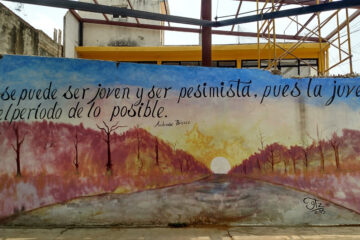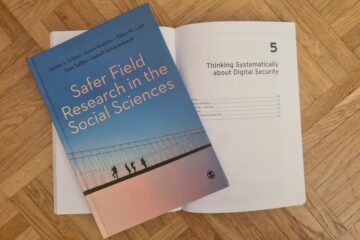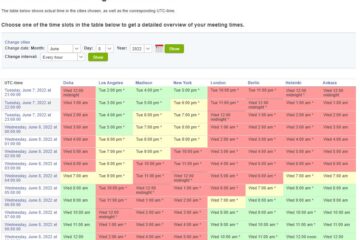by Aili Mari Tripp, University of Wisconsin-Madison, Wangari Maathai Professor of Political Science and Gender & Women’s Studies
Covid-19 hit just as I was about to embark on a summer of fieldwork in 2020 in Uganda and Botswana, followed by research over winter break and the following summer (i.e., 2021) in Mauritania and Namibia. I had planned to carry out in-depth face to face interviews with women’s rights activists, ministerial representatives and ministers, party leaders, members of parliament, lawyers, journalists, academics, human rights activists and others for a project on women’s rights in authoritarian regimes. I had secured a fellowship at the Wilson Center for International Studies to work on the project for the fall 2020 and spring 2021 semesters. Because of the outbreak of coronavirus and the uncertainty of where we were heading in the US and these African countries, I had to change my plans drastically. I had worked in Uganda extensively in the past, but the other countries were new to me, although I had visited Namibia and had read the literature on all the countries. I had selected the countries, in part, because they represented different regime types, ranging from authoritarian to hybrid and democratic regimes.
I decided to continue with the project, but I would do the interviews using videoconferencing platforms. I went ahead and got human subjects approval for the study in the spring of 2020 as it became clear that I would not be able to travel over the summer. I followed the same procedure to request approval as I normally would have, only mentioned that I would be conducting interviews over the phone or the internet. I used my connections to hire research assistants in each country. I added Zimbabwe to the list of countries. I ended up with over 150 interviews in all five countries combined. I accepted the Wilson Fellowship and came to Washington. There were only a few of us and they allowed us to work at the Center without a support staff.

Conference of small scale entrepreneurs that Aili Tripp helped organize in Mwanga, Tanzania in 1992 (she is among the group).
Working with Research Assistants
I hired a variety of individuals with different backgrounds as research assistants. Two were graduate students working on gender and politics/law; one was a women’s rights activist, one was a professional NGO consultant; one was a journalist who was well-networked in civil society; and one was a well-connected professor who worked with a grad student.
We used a Google calendar to schedule the interviews. We shared joint information in a set of folders, organized by country, in Box, which we all updated regularly. We used an excel sheet to number the interviews, document the dates of interviews, and noted the contact information of the interviewee, their title, through what contacts we located them, and a brief bio. Before the interviews, either I or the research assistant Googled the individual and came up with a bio, which I used in developing the questions. I read articles about the interviewee and watched videos of them if available. This helped in writing questions. My research assistants informed me of things I needed to know about the political context that were not self-evident. I did not share interview transcripts with the research assistants because of IRB requirements.
I asked the research assistants to suggest a going rate of payment (a lumpsum for x interviews) since I had no clue what a decent rate was for each country. The rates seemed reasonable. For those that asked for too little relative to others, I paid more.
Conducting Interviews
I let the interviewees decide which medium they felt most comfortable with, and so I alternated between videoconferencing platforms like Zoom and Skype and phone interviews via Whatsapp. If I could not get a good connection with my phone, I often called the respondent’s phone from Skype and that generally resulted in a better connection, although it was more expensive than a regular Skype or Zoom call.
I taped the interviews using my professional Zoom audiorecorder, but I also made sure to have two other recording backups (a combination of Zoom, Skype, or my iPhone). I did not need to use a headset, which made recording easier. Surprisingly everyone agreed to be taped in the interest of accuracy. One ex-minister sent me their replies to my questions in writing. A few wanted the transcript, a request which I was happy to oblige. I used a transcription company, Rev.com for the transcriptions. They did a marvelous job. They were quick and mostly accurate, even with foreign accents. I supplied them with a glossary of names of people and places for each country, which really helped. As I was conducting the interviews, I would write down these names as the interview progressed and later double checked the spellings in Google. When necessary, I would ask the interviewee how to spell a name if it was the name of someone not known.
One of the biggest challenges was establishing a rapport with interviewees. Sometimes I found out things about them on the internet that were amusing or interesting and asked about this information to break the ice. Some of the academics had studied at my university or in the US and so we shared a discussion of people we knew in common or some experience they had in the United States. Some activists were friends with other activists I knew, and so that became a topic of discussion. Sometimes we talked about current events in their country or in the United States. People had a lot to say about the US elections, President Trump, January 6, and Black Lives Matter.
Sometimes, I noticed things in respondents’ Whatsapp photos that I brought up casually. One woman had green peppers in her photo and at some point in the interview I asked her if she grew them and when she was going to invite me to enjoy them with her. That led to a chatty fun discussion that helped break the ice. Some had pets and children, who intruded on the interview, so those were other fun topics. Most had chickens, goats or loud birds in the background, and those became another side topic of discussion. Finding something to laugh about together was important for me to create a sense of trust and rapport with the interviewee.
I try to find ways to gently flatter people based on their years of experience, their contributions to a movement, their extensive writing on a subject, their contributions to a constitutional or legislative reform, or how much I had learned from reading their work. I want them to feel good about doing the interview and this helps put them at ease, especially when I have tough questions. I want my interviewees to know that regardless of what I am asking, I respect them and their knowledge.
I had to be flexible in scheduling the interviews. Because of the time difference, which was as much as 8 hours depending on where I was calling from, I had to wake up early. Regardless of how early I had to wake up, I made sure I looked professional out of respect for the person I was interviewing, unless I was doing a Whatsapp call. Some people preferred phone calls because they took up less bandwidth.

Aili Tripp and Sally Mjema, research assistant, in Tanzania in 1990.
Challenges
The biggest challenge, honestly, was navigating my university’s accounting system and getting the payments to the research assistants in time. This was out of my control and it caused no end of grief for me and the research assistants. In the past, I have paid people in country and gotten reimbursed. I don’t know if it would have been any easier this time had I done research in country, but the slow transfer of funds from my university brought the study to a halt in two instances. Once the money was actually sent, it transferred quickly.
I used secondary sources and online newspapers to identify the people I wished to interview. I also gave a list of categories to the research assistants who were helping me select respondents. I had much less control of the selection process than I normally have when I am doing the soliciting myself in person. I found that when I sent emails to people, I rarely received a response, so it seemed much better for someone in country to try to make the connection on my behalf over the phone, sometimes working through their own connections in country. Covid and lockdowns in these countries meant that while on the one hand, the assistants were limited to using their phones and often had difficulty locating people, they also found many people more available since the interviewees were working from home and had fewer obligations.
One major consideration for research assistants on the ground is how they solicit interviews in a time of Covid-19 and whether they are doing it safely, a question that often extended beyond human subject committee regulations. IRB committees are not necessarily asking about such protections, but it is important to know that assistants are masking and distancing if they visit potential interviewees or their workplaces. In the countries I was working, vaccinations were not widespread. One has to consider whether undue harm might ensue from a face-to-face interaction.
These challenges of contacting people would have been much greater had I been working in a rural area or in an area where people did not have cell phones. I was interviewing primarily political elites, women’s rights activist, and other civil society actors, which made it easier to arrange the interviews.
Another downside was the obvious fact that I was not in country and could not benefit from the kind of learning that goes on through first-hand experiences: the informal schmoozing and discussions, witnessing first-hand various events, listening to the local media, running into people serendipitously, and attending university lectures and other related events.
However, because of the increased use of Zoom meetings, I was able to listen in on many Zoom events related to my project that were organized by women’s organizations and academics. While this is not a substitute for attending in-country meetings and events, it was fascinating. The Zoom format allowed for a broader selection of speakers and participants, also from other countries.
One method I did not try but seems worth exploring is the use of posing questions on Whatsapp groups, Clubhouse groups, and Facebook groups.

Aili Tripp in Northern Uganda during the war in 2005.
Concluding Thoughts
I think that graduate students who have not done fieldwork before may find digital fieldwork challenging because they have not had experience doing in-person interviews and have not had a chance to “soak and poke.” To be sure, the Ugandan interviews were the easiest to arrange because so many people knew of me and my work in advance even if I did not know them. I also had the best questions because I knew much more about Uganda than the other countries. Even though I was not familiar with two of the countries I worked in, I have conducted fieldwork and hundreds of interviews throughout Africa over the past 35 years, and so it was not as difficult as it might have been otherwise.
I think the hardest aspect of doing this kind of research is getting over the initial hesitation because fieldwork over the phone or internet is not something academics generally do. It gets easier over time as one realizes that it is doable even if it is not ideal. I suspect some of this type of research will continue after Covid-19. But even then, there is no substitute for doing research in country in person. Nevertheless, doing digital interviews is the next best thing given the lack of other options.


